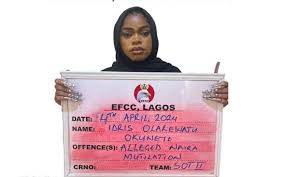Bobrisky's Arrest at Lagos Airport: A Controversial Incident
In a surprising turn of events, Nigerian social media influencer and cross-dresser Bobrisky was arrested at Lagos Airport, drawing significant attention and sparking widespread discussion online. Known for his flamboyant lifestyle and candid expressions of gender identity, Bobrisky's presence in the public eye has often been a source of both admiration and criticism. His recent legal troubles have reignited debates about LGBTQ+ rights and the cultural climate in Nigeria.
Bobrisky, whose real name is Idris Okuneye, has gained notoriety for his bold persona, often challenging societal norms regarding gender and sexuality. He rose to fame through social media platforms, where he shares beauty tips, personal anecdotes, and insights into his life. However, his lifestyle has not been without controversy, especially in a country where homosexuality is criminalized and deeply stigmatized.
Reports of Bobrisky's arrest indicate that he was taken into custody due to allegations related to fraud. Eyewitness accounts suggest that law enforcement officials apprehended him during a routine check at the airport, prompting a flurry of speculation about the circumstances leading to his arrest. While details remain scarce, this incident has amplified discussions around issues of fraud and corruption, particularly within the realm of social media influencers who often flaunt their wealth and success.
The reaction to Bobrisky’s arrest has been mixed. Supporters have expressed their outrage, viewing the arrest as a targeted attack on a prominent figure in the LGBTQ+ community. They argue that Bobrisky’s flamboyant expression of identity challenges conservative values and norms in Nigeria, which can lead to hostile reactions from authorities and segments of the population. On social media, hashtags supporting Bobrisky quickly emerged, with fans calling for his release and criticizing the Nigerian legal system for its treatment of marginalized individuals.
Conversely, critics of Bobrisky have seized the opportunity to voice their disdain, viewing his arrest as a form of justice for what they perceive as his excesses and moral transgressions. In a society that often punishes those who deviate from traditional gender roles, Bobrisky’s public persona has made him a polarizing figure. This incident has highlighted the broader societal divides regarding issues of gender, sexuality, and the legal repercussions faced by individuals who challenge conventional norms.
The Nigerian government has long been under scrutiny for its stance on LGBTQ+ rights. The Same-Sex Marriage Prohibition Act, enacted in 2014, has created a hostile environment for LGBTQ+ individuals, leading to discrimination, harassment, and violence. Bobrisky’s arrest has brought these issues to the forefront, prompting discussions about the need for legal reforms and greater acceptance of diverse identities in Nigerian society.
As news of Bobrisky's arrest continues to circulate, it raises critical questions about the intersection of celebrity culture, legal accountability, and social justice in Nigeria. The incident serves as a reminder of the precarious position that many LGBTQ+ individuals occupy in a country where their very existence can be deemed illegal.
In the aftermath of the arrest, supporters are mobilizing to advocate for Bobrisky's rights and to challenge the stigmatization of LGBTQ+ individuals in Nigeria. They argue that everyone deserves the right to express their identity without fear of persecution. Whether this incident will lead to broader conversations about acceptance and rights remains to be seen, but it has certainly sparked a dialogue that is both necessary and overdue.
As the situation unfolds, all eyes are on the legal proceedings that will follow Bobrisky's arrest. Will this incident lead to a shift in public perception and policy regarding LGBTQ+ rights in Nigeria, or will it further entrench existing biases? The answers to these questions may shape the future of gender and sexual identity discourse in the country, as well as the experiences of those who navigate these complex social landscapes.


